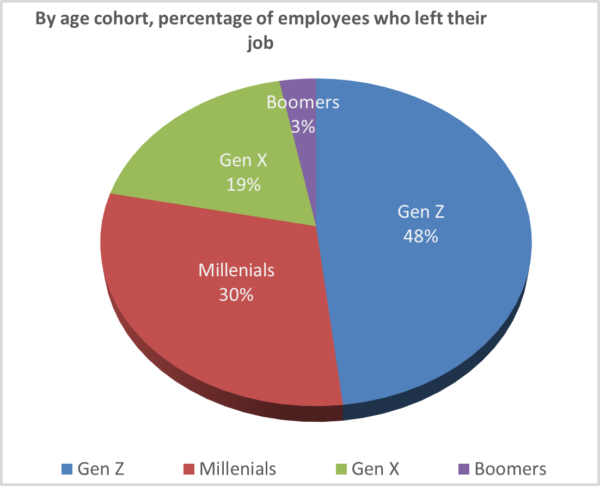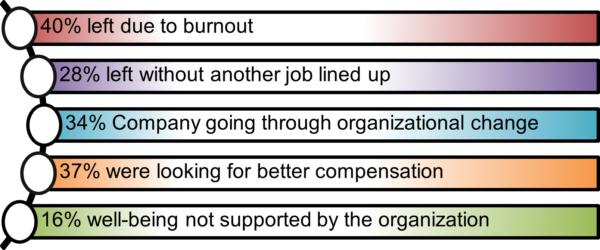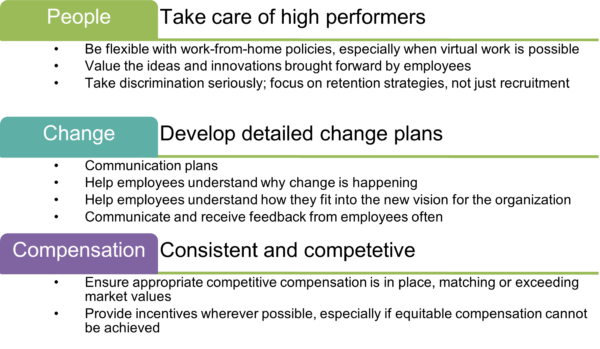I love tracking weather systems. I pay a lot of attention to the sky, the horizons, potential of coming storms, changes in the temperature, and air pressure. I recall excitement I felt the first time I heard terms like El Niño or La Niña and just needed to find out more. In more recent years, I have begun to wonder if we are trying too hard to explain weather patterns with catchy terms. For example, I grew up on the prairies where we experienced \weeks of cold winter, and it was good enough for me to know it was really cold. I did not have to hear the term Polar Vortex to know I should put on mitts and boots. Alberta Clipper, Saskatchewan Screamer, Manitoba Mauler; they all mean the same thing – serious winter storm. In searching deeper, these terms just reflect the region of the storm’s origin.

But let’s get to the point of my story. We are surrounded by terms that serve to drive our opinions towards conclusions that are not always accurate. One such term, the Great Resignation, is one that I would like to unpack a little more fully.
I had another opportunity the other day to give a great reference for a fellow Edgewalker who was looking for something new and different to grab onto. She and I are both fortunate (as are many who are reading this) that we work within a larger organization where significant job change does not require us to completely resign. But she is moving far enough that she will be significantly unreachable by those she is leaving, and her new roles will be significantly new. Her path is very familiar to me, as I followed a similar path only months ago. I have watched a noticeable number of Edgewalkers also following this path over the past several years. Some have made minor career shifts, while others have completely walked away from their employer to seek the “something’s missing” that they have been feeling.
Dr. Anthony Klotz coined the term Great Resignation in May 2021 to identify the trend of employees expected to leave current roles during or towards the end of the pandemic.[1] It has looked differently depending upon where we live, but it is hard to deny that there has been something afoot, especially since the onset of the COVID-19 pandemic in early 2020. I was already in a new role within my organization, but found that as COVID arrived, stakeholder relations shifted as partners shifted focus to taking care of the home front and acquiring what they needed to maintain the basic needs of their own organizations. Those of us supporting these partners and stakeholders remained faithfully on the job as we tried to shift policies and processes to keep up with the swift, often daily changing needs that they expressed.

I will be the first to admit that my focus also changed over the past two years. I was more aware of my sense of accomplishment and lack thereof in relation to how I felt I was contributing to the goals of my organization. I was struggling to find meaning and significance although during COVID-19 I was a two-time nominee and one-time recipient of a Deputy Minister’s Award. Others acknowledged my contribution, but I could not. I felt restless but remained loyal to partners and stakeholders as well as to my employer. They appreciated me, yet I did not feel like my role was a good fit for me. But as the case has been for me over my career, I am a very loyal person and chose to stay where I was, although I was not completely happy. But as the case has also been, I was alerted by my mentors to other job opportunities that could be my next career move.
I have been in my new role since September 2021 and find my work exhilarating each day. I am a contributor and affecting positive change in my organization. My skills and abilities are not only being used but are also challenged with each new task. I have rediscovered the “sweet spot” in my work as I aim for lofty targets and help others aim for their visions.
Edgewalkers, was I part of the Great Resignation that Dr. Klotz spoke of? Perhaps I was. I certainly experienced an internal review of my career goals, personal values, and desires. This is consistent with the findings of recent studies. But perhaps it was just coincidental.
While researching the Great Resignation, some market trends have been spotted, which you and I might be able to identify with. First, a September 2021 worldwide LinkedIn poll revealed that younger employees are leading the exodus from their job.

Baby Boomers like me (and like some of you) made up only 3 per cent of those disrupted employees since the onset of the COVID pandemic, while the two youngest cohorts (Generation Z and millennials) made up 78 per cent. As a Boomer, I can only speak for myself to say that I have a strong sense of loyalty, tenacity, and resilience when it comes to how I respond to changing workforce and environmental change. We boomers have life experience, and this experience serves us well. Younger generations have abilities and philosophies on life that are unique in many ways to those of boomers. They are not wrong or lesser than, just different and unique. I respect that. More important than the generational differences, I am more concerned about the statistics that speak to the condition of the employees as they were leaving their jobs.[2]

Edgewalkers, we are challenged to consider the markers of the Great Resignation as they relate to who we are as game-changers, helpers, and innovators. Our organizations are hurting, but only because the organic nature of the organizations (the people) are hurting. Our challenge is to pay attention to the dynamics that are occurring in our organizations and have bold conversations with our leaders. Our people are hurting and leaving, and some of them are not recovering.
Find in-roads
We may not all be in positions that lend themselves to quickly influence leadership. But we are wired to observe, perceive, and feel the pulse of the organization. If we are attentive and serious about affecting change, then the change starts with us. A serious conversation with immediate managers can spark the ideas that lead to change. Find the opportunities to discuss possible investigative solutions that could lead to better work culture.
Focus on improvement
Improving culture, policies, and processes can work wonders for personal and organizational wellness. A healthy work culture is key to engaged, motivated, and high-functioning employees and teams. Consider the desired future state and intentionally identify the obstacles standing in the way of achieving the goals identified there. Removing obstacles will be the key to success. If actions focus on addressing barriers, then they will be effective actions. Some instant and attainable actions are listed below and address the above-noted factors contributing to job departures.

Volunteer to be part of the solution
The four most important words in leadership are “How can I help?” Practice this mantra and believe that we are called for this purpose. We are helpers. We are Edgewalkers. We are risk-takers. Change really does start with us. Change starts with “me”. The best corner-of-the-desk practices are those which create cultures of change, drive solutions and improvements, and impact individuals and organizations.
The search for wellness and satisfaction often seems like a great struggle. Along the journey many will walk away or resign from trying. The Great Resignation is the result of multitudes of people who are searching. Resignation might be the best thing that they could do for themselves. Leaving forces change to happen. As Cloud and Townsend have said, “We change our behavior when the pain of staying the same becomes greater than the pain of changing.” The great promise in this statement is that things will get better once we commit to making changes, as long as they are the right changes, for the right reasons.
Remember Edgewalkers, we are never trapped. Opportunity and exploration are within our grasp. Accept the challenge to be the game-changer for yourself and for those around you within your spheres of influence, communities, and organizations.
Donovan Mutschler, MA, MCFor more information on this or other topics of interest contact Donovan Mutschler at donovan@edgewalkers.ca.
Title Photo: Lara Dawn Photography
[1] www.limeade.com. (2021). “Limeade Care Report: The Great Resignation Update,” data summary.
[2] Cohen, Arianne (2021). How to Quit Your Job in the Great Post-Pandemic Resignation Boom. Bloomberg Businessweek. Bloomberg.com.
Great article Donovan ! It’s interesting how a compassionate person can translate that sense of caring into a written article. I can almost hear your voice as I read. Thank you for sharing your thoughts and strategies with us (the reader).
Thank you Jim! I appreciate your insight and feedback. As a valued member of the Edgewalker community, you (and all other readers) continue to inspire me!